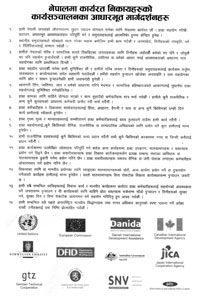 |
Aid agencies have issued their second undertaking in four years to show fairness and transparency in the most unequal country in Asia. On the face of it, the code of ethics is to be welcomed. However, the proof of the pudding will be in its implementation.
The Basic Operating Guidelines (BOG) are just that: basic, selected for the least common denominator. 'Operating guideline' appears to be the operative noun coined to contain a set of instructions that can be used to help make a decision or form an opinion in difficult situations. The BOGs aren't binding. Individual donors are free to come up with excuses not to follow some or all the guidelines. No objection can be raised for their non-observance. In that sense, the BOG is a propaganda tool.
Donor activities in Nepal go largely unexamined by civil society and the press. It's Foucault's famous formulation at work: money, power and knowledge implicate each other. Those who make opinion here in Kathmandu do so freely, but the extent of their freedom is defined by the knowledge-power nexus at the service of international agencies.
Donors have reaffirmed their pledge to 'operate in all areas of Nepal in transparent and inclusive manner'. The commitment to extend their activities in areas other than tourist destinations and trekking routes is laudable. But transparency? It takes some daring and patience to endure personal humiliation to pass through multiple security checks of the UN Fort at the BICC. Even INGOs today hire multinational security guards that consider every Nepali visitor to be a potential baddie. But it is the hollow promise of 'inclusiveness' that raises eye-brows.
Criteria for inclusiveness are personnel and programs, in that order. In the absence of public accountability, programs of international agencies are excessively influenced by people involved at the decision-making level. They are overwhelmingly English-speaking young achievers from upper-middle class families, the kind that has back-slapping familiarity with the centres of legislative, executive, judicial and media power in Kathmandu. Most donors have succeeded in maintaining reasonable gender balance, but few recognise the importance of caste, creed, class or community in giving a sense of inclusion to their workforce.
Large white SUVs, jet-setting ways and a wide lifestyle gap are a part of the neo-colonialism of aid. Waste and extravagance set the lords of poverty apart from the native substrate.
The pathologies of foreign assistance such as phantom or boomerang aid (the money that is paid to home-country consultants and suppliers in the name of the recipient state), edifice complex (building for show rather than utility), fix-up deals (providing sinecures to native elites), chasing rainbows (policy canvassing at international fora) and politics of patronage can be seen in Nepal, too.
Adopting a BOG is not intended to change this part of the culture. However, the commitment at least shows that signatories are ready to be accountable. This is an opportunity that stakeholders in Nepal must seize.
Parliamentary oversight is the best method of ensuring accountability in foreign aid management. Last week the Inter-Parliamentary Union (IPU) meeting in Geneva called for more parliamentary supervision of state policies on foreign aid and their implementation. It denounced tied aid and members of the IPU Standing Committee on Sustainable Development, Finance and Trade agreed that giving a free hand to donors was detrimental to the interests of recipient countries.
But, beggars can't be choosers. One who pays the piper calls the tune. Donors will continue to have their way as long as they don't face scrutiny from their partners in Nepal's civil society.



